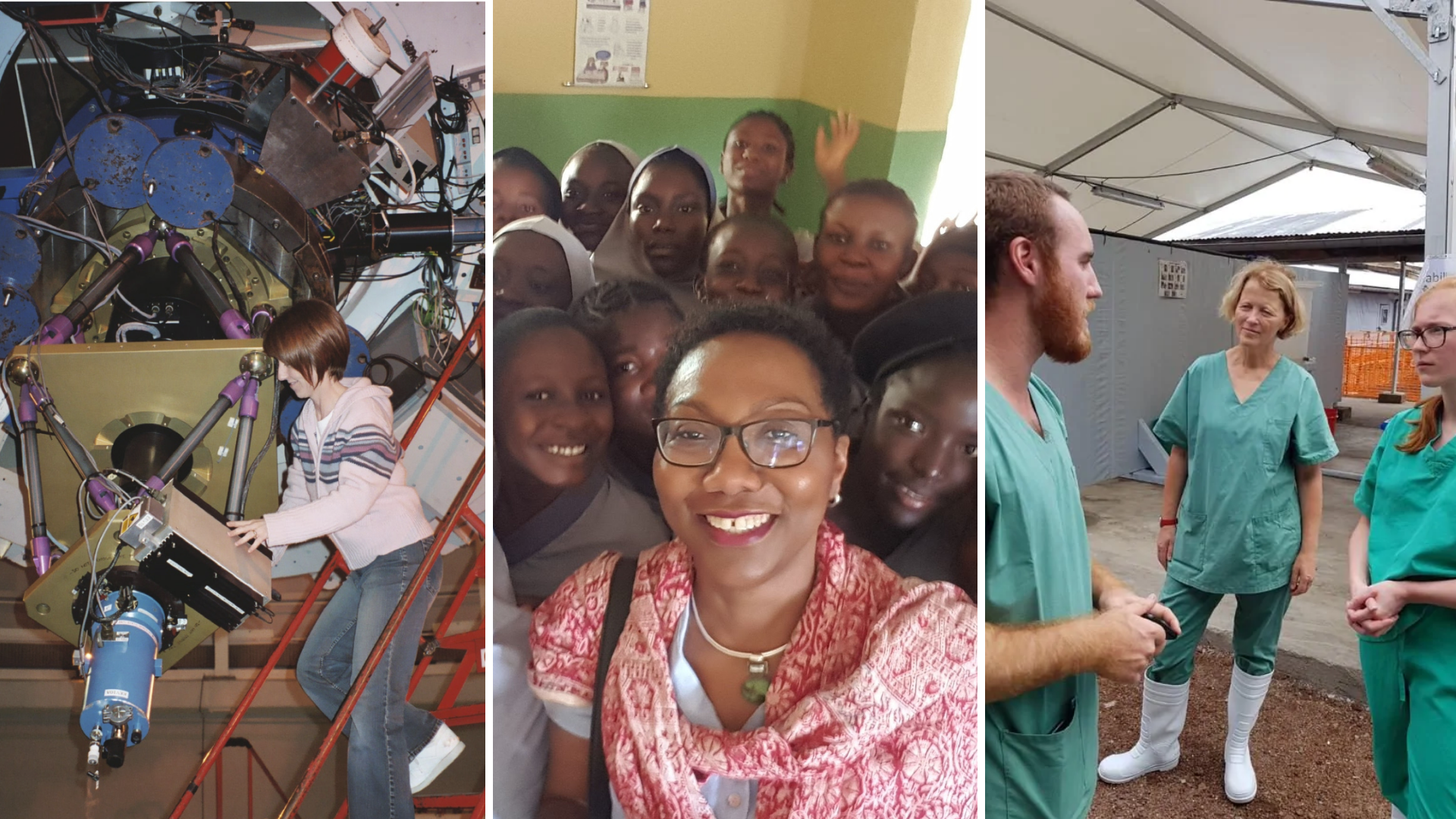It has been globally acknowledged that both science and gender equality are critical to achieving development and delivery of the UN Sustainable Development Goals. But at present, less than 30 percent of researchers worldwide are women.
UNESCO’S International Day of Women and Girls in Science on 11th February highlights the achievements and challenges of female researchers and scientists from around the globe in an effort to inspire, empower and support the visions and aspirations of young women.
Working as Chief Scientific Advisor, the Chief International Science Envoy and the Director of Education, Gender, and Equality respectively for the UK’s Foreign, Commonwealth and Development Office (FCDO), the issue of gender equality in science is both personal and professional to all of us.
We are aware of, and have experienced personally, the challenges that women in science face in their careers. When there are new science, technology, engineering and mathematics (STEM) opportunities, women gain only one, while men gain five[1]. During the current pandemic, women are 70% of the global health workforce but underrepresented in COVID-19 decision-making leadership and media commentaries. A June 2020 article in The Lancet points out that women have made up just 24% of COVID-19 experts quoted in the media and 24.3% of national task forces analysed [2].
Stereotypes and cultural norms dampen girls’ interest in STEM, by the age of 6, girls consider boys more likely to show brilliance and more suited to ‘really, really smart’ activities than their own gender.[3]
The importance of encouraging a new generation of female scientists to tackle the major challenges of our time, in part through challenging the false stereotype that girls and women cannot like or do science, is greater than ever. Too often, if people think of a scientist, they think of a man. We need to tackle such assumptions: girls need to be encouraged, and not questioned, if they show an interest in science.
Gender bias is the biggest challenge for women and girls in science and education. This may manifest itself in a lack of role models, subtle structural barriers that prevent women progressing in their career, to sexual violence and harassment that drives them out of male dominated fields or prevents them from learning or entering education or science in the first place.
The false underpinning belief that only boys or men are capable or entitled to education or to study or work in science needs to change. We need all – not half – the talent at the table to tackle our biggest global challenges. This is why keeping girls in school is really important and creating the safe, welcoming and equal post-school opportunities and environments to ensure they can continue to thrive throughout their careers. Although the scale of the disadvantage that marginalised adolescent girls face in education is enormous. [4]
Our recommendations to thought leaders and influential figures in science and education to overcome these barriers;
“Expose the hidden power structures in your organisations, see where the gender barriers are and remove them. This work takes courage. Connect with like-minded change makers and drive transformation change. Tackle unprofessional and inappropriate behaviours in the process, to ensure the structural changes stick. Research shows that your organisation will be all the better for it.” Carole
“Talk to and listen to women at the early stages of their career, and make the changes needed to make their return and career progression feasible. Young female scientists need to feel comfortable that a career in science is workable, alongside any aspirations they may have to have a family. Some talented women do not return to science after having a family, as the practicalities feel unworkable.” Charlotte
“Be visible and be out there advocating, but perhaps more importantly, just be in your community and girls will see that. Bring it down to the community level. Look, behave and be relatable when promoting yourself and girls/other women will pick up on that. At times that alone is enough.” Alicia
Our advice to girls and women, whatever stage of a STEM career they are in;
“Go for it! Careers in science are exciting and rewarding. At times it will be difficult, especially if you are breaking new ground, but the benefits will outweigh the challenges, and you will pave the way for the next generation of female scientists.” Charlotte
“Work on something that excites you and with people who value and energise you. Make networks to support and sustain and don’t be afraid to reach out to senior leaders in your field who you admire and ask them to be your mentor. They are busy people, but they might just say yes!” Carole
“Sometimes you will have to put your fingers in your ears to anything negative and keep going. Look at influencers in your community and globally. Make sure to surround yourself with people and systems to support you as there are times you will tumble or hit a low point.” Alicia


 When I was living in Zimbabwe, conducting field research on commercial sex and HIV. Talking to women – not only women selling sex in bars, but also my co-workers and field workers – I heard about how violence, and the fear of violence shaped and constrained women’s lives. This led me to question why violence, including forced sex, wasn’t being acted upon by HIV programmes.
When I was living in Zimbabwe, conducting field research on commercial sex and HIV. Talking to women – not only women selling sex in bars, but also my co-workers and field workers – I heard about how violence, and the fear of violence shaped and constrained women’s lives. This led me to question why violence, including forced sex, wasn’t being acted upon by HIV programmes. The moment my name was announced as FDM everywoman in Technology Awards – 2016 was a defining moment in my career. I was in a small group of inspiring women finalists from across the global technology sector, not academia – my usual environment. The room was filled with nearly 600 outstanding women leaders in the tech sector and it was thrilling to celebrate the achievements of exceptional women making a difference in the world. The award was completely unexpected, and I was stunned and humbled to be recognised for my foundational research and innovation, and the work I had done to support women in my field. The award has pride of place in my office to show other women what is possible, how important and energising it is to reach outside of our comfort zone and immediate industries, and to connect and support one another wherever we are in the world.
The moment my name was announced as FDM everywoman in Technology Awards – 2016 was a defining moment in my career. I was in a small group of inspiring women finalists from across the global technology sector, not academia – my usual environment. The room was filled with nearly 600 outstanding women leaders in the tech sector and it was thrilling to celebrate the achievements of exceptional women making a difference in the world. The award was completely unexpected, and I was stunned and humbled to be recognised for my foundational research and innovation, and the work I had done to support women in my field. The award has pride of place in my office to show other women what is possible, how important and energising it is to reach outside of our comfort zone and immediate industries, and to connect and support one another wherever we are in the world. Back in the early 90s I lived in a low-income urban community in Guyaquil Ecuador, conducting research with a well-known academic and writer on gender issues. We were researching the impact of economic austerity on poor urban households, particularly women. I was inspired by the female community leader, Senora Enma, (female political leaders were uncommon at that time in Ecuador and Latin America). She was the centre, co-ordinator, firebrand, and interface between local government and the community. She fought for additional resources and for improvements in living conditions, education and health. This experience has stayed with me and is often a reference point for my work in development. We should never underestimate the power of grassroots action and the women who lead it.
Back in the early 90s I lived in a low-income urban community in Guyaquil Ecuador, conducting research with a well-known academic and writer on gender issues. We were researching the impact of economic austerity on poor urban households, particularly women. I was inspired by the female community leader, Senora Enma, (female political leaders were uncommon at that time in Ecuador and Latin America). She was the centre, co-ordinator, firebrand, and interface between local government and the community. She fought for additional resources and for improvements in living conditions, education and health. This experience has stayed with me and is often a reference point for my work in development. We should never underestimate the power of grassroots action and the women who lead it.
Comments